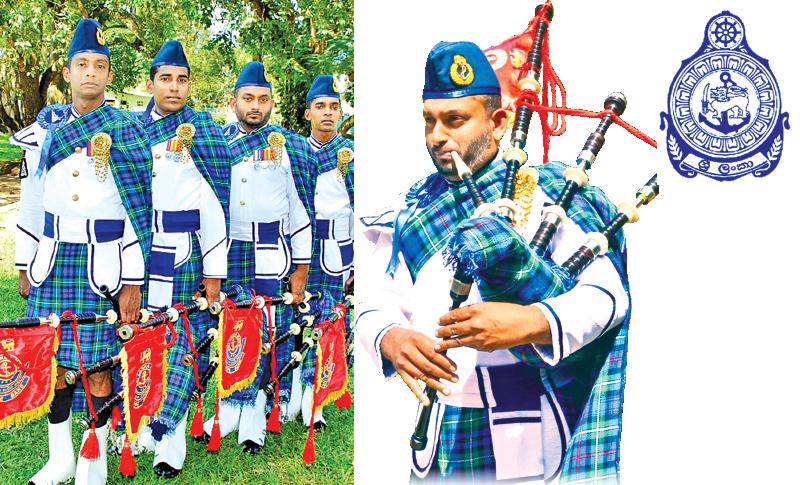
Sailing vessels of the British Admiralty have a rich tradition that is laden with ceremonial pomp and decorum. These ceremonial rites and customs have with time been bestowed on the Sri Lanka Navy, which has its maritime roots from the Royal Navy.
Almost seven decades later the Navy proudly sustains these timeless routines and drills. One such colourful display of expression are the majestic naval bagpipers.
 The bagpipe are rather complex yet unique instrument, has its origins in the cold salubrious highlands of Scotland: where ancient clans used these pipes as a means of signal based communication. The deep yet sharp notes from the pipes would resonate across the valleys and were often used to warn of impending danger. Some opine that it was played by the ancient Assyrians. Thankfully with time the bagpipes were calibrated to have nine notes and are used as a musical instrument.
The bagpipe are rather complex yet unique instrument, has its origins in the cold salubrious highlands of Scotland: where ancient clans used these pipes as a means of signal based communication. The deep yet sharp notes from the pipes would resonate across the valleys and were often used to warn of impending danger. Some opine that it was played by the ancient Assyrians. Thankfully with time the bagpipes were calibrated to have nine notes and are used as a musical instrument.
The bagpipes were common in almost every regiment of the British military, and thus when Ceylon was a maritime domain of the British Empire slowly but steadily they became part of our naval ceremonial tradition. Today out of the nearly 300 strong Navy band and cultural troupe there a select 30 sailors and Petty Officers who wear a distinct badge: the badge of the bagpiper. These elite musicians are a close knit fraternity who live and work at Welisara Naval Base.
I set out on Tuesday morning to meet this “special clan” of the Sri Lanka Navy. The person who oversees this team is Commodore Jude Peiris, Director Naval Band. This amiable officer explains, ‘The bagpipers are very unique to the Navy. We are the first force to have this musical tradition from 1966.’ He goes onto explain the process of forming these talented men to excel at what they do.
Commodore Peiris said, “All sailors undergo their basic naval training. Those who want to join this unit are selected by an ear test and also physical fitness, as the pipes require lots of endurance. Once the men complete one year of training they are then ready to perform. Yet we practice daily, to maintain high standards”. Initially a Band Master from the Royal Marines was in charge with a bugle major named Closse.
The bagpipes cost almost rupees 3 lakhs each. The parts include a synthetic bag (older ones had leather bags), a bass, middle and side drone, service chanter (on which the melody is played) a mouth piece to blow and the naval banner.
The bagpipes are a double reed instrument. The chanter and drones are made of expensive African black wood. Hence they are cleaned daily and weekly. Each sailor must care for his instrument.
The uniform consists of a kilt, white tunic, plaid (in green and blue squares draped on the shoulder), stockings and a cap.
We now go to the field along with the units Pipe Majors - Chief Petty Officer I.PK. Priyadarshana and Chief Petty Officer JHM Bandara, who have both trained in Pakistan.
A group of four sailors fully clad in ceremonial kilt are ready to give us a beautiful rendition. I have seen these men perform many times at the annual sea Sunday service. Playing the pipes is one task, yet marching in formation along with the full navy brass band is a very focused task. The pipers take the first echelon in the parade, right behind the smart drum major. Here they slowly release their bass and grace notes together.
The drum major has 17 swift movements of his mace by which he gives commands and directions to the marching band. A visiting head of state is given six pipers as a naval custom.
The bagpipers practice daily from 9am to noon and later from 8.30pm to 10.30pm to sound perfect. By tradition they play hymns such as Amazing Grace at Cathedrals, tunes for marching and even solemn songs at Naval funerals.
The traditional pipe tunes are Scotland the Brave, Bonnie Dandy and Road to the Isles. Former band director Cdr. Premalal Danwatte composed a local tune Sagara Gamana, which is the Navy march.
As the Navy celebrates 67 years of service to the nation the bagpipers continue to maintain one of the finest musical traditions in military service.

The naval drum major, Lieutenant and Chief Petty officer
